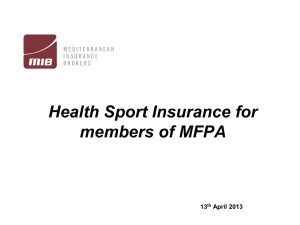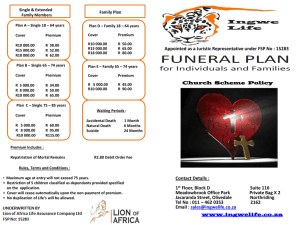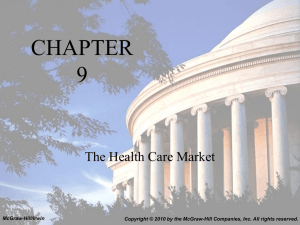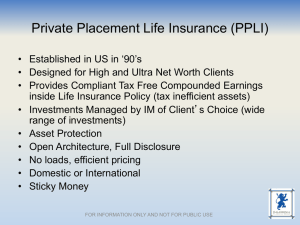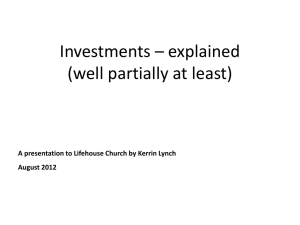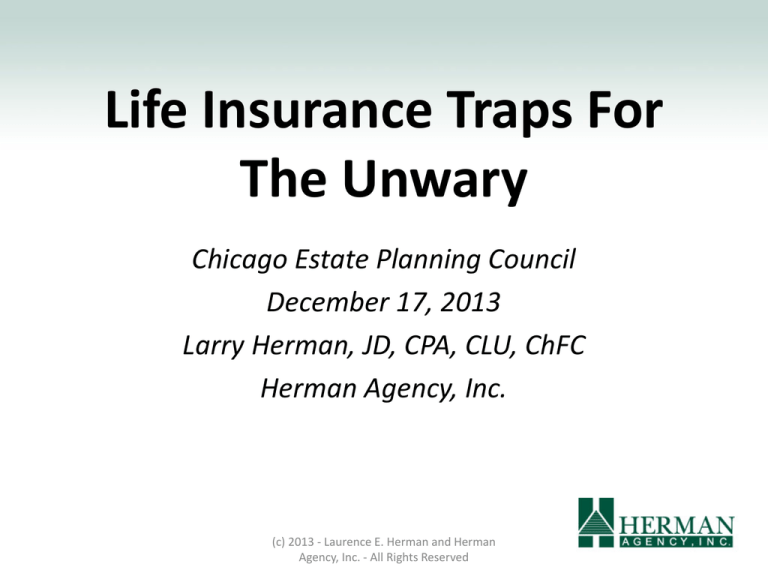
Life Insurance Traps For
The Unwary
Chicago Estate Planning Council
December 17, 2013
Larry Herman, JD, CPA, CLU, ChFC
Herman Agency, Inc.
(c) 2013 - Laurence E. Herman and Herman
Agency, Inc. - All Rights Reserved
Policy
Valuation
Traps
Policy Transfer to ILIT
Jane owns a $5,000,000 10-year level term policy on
her life. Policy Date is 1/1/10, and annual premium
is $5,000. To get the death benefit out of her taxable
estate, Jane’s advisor recommends transferring the
policy into an ILIT on 7/1/13. Jane submits an
ownership and beneficiary change form to the
insurance company, treating the transfer as a gift.
The insurance company processes the change and
issues Jane a Form 712 reporting the gift tax
valuation of the policy.
Issues?
• The Obvious: Sections 2035 and 2042 (3-year rule)
triggered if a gift.
• Not a big deal until it is!
• Liability if could have avoided estate inclusion?
• The Not So Obvious: Policy valuation
Policy Valuation – Gift and Estate
Tax Purposes
• “Fair Market Value” = “price at which such property
would change hands between a willing buyer and a
willing seller, neither being under any compulsion to buy
or sell, and both having reasonable knowledge of the
facts.” (Treas. Regs. 25.2512-1 and 20.2031-1)
• Life Insurance policy (not paid-up) = Interpolated
Terminal Reserve + unearned premium (Treas. Regs.
25.2512-6 and 20.2031-8)
Form 712
Interpolated Terminal Reserve
(“ITR”)
• Insurance Company reserve to meet contractual
obligations
• Original IRS ITR regulatory guidance from days of
Whole Life and Annually Renewable Term (“ART”)
• ART has no reserve value (matures each year)
• Whole Life ITR tracks cash value
• What about today’s level term and guaranteed death
benefit Universal Life Policies?
Reserve Methods Vary By Carrier
and Product
•
•
•
•
Tax Reserve
Statutory reserve
AG 38 Reserve
Deficiency Reserve
What Will The Form 712 Show?
Summary of Values at the End of Year 5
Carrier
Policy
Type
Face
Amount
Cumulative
Premium
Cash
Surrender
Value
Value
Reported
by Carrier
A
GUL
$10,000,000
$1,965,000
$475,861
$475,861
UL
$10,000,000
$1,965,000
$749,100
$749,100
B
GUL
$10,000,000
$1,825,000
$340,827
$1,024,778
UL
$10,000,000
$1,825,000
$780,106
$948,106
C
GUL
$10,000,000
$1,733,900
$0
$1,883,607
UL
$10,000,000
$1,733,900
$570,023
$855,241
Used with permission of AALU
What About Level
Term Insurance?
• At least two major carriers use “unearned premium”
• Most carriers report reserve values that are
exponentially higher than “unearned premium”
Isn’t This Crazy?
•
•
•
•
Inadequate guidance = inconsistent interpretations
Recognized problem but no clarity yet
ABA Task Force on Policy Valuation
“Unringing the bell” - Taking a position contrary to
the Form 712?
• Suggested starting point: Informal request to carrier
for Form 712 valuation – Don’t trigger issuance of
Form 712
Sale vs. Gift – A Better Approach?
• Sale valuation – “FMV” – ITR language of Treas. Reg.
§25.2512-6 and Form 712 doesn’t apply because not a gift
• Common notion of “willing buyer/willing seller”
• What would you pay for a term policy? A cash value policy?
• When might you pay $200,000 for a policy with $100,000 of
surrender value?
• Pricing anomaly?
• “Springing Cash Value”?
• Adverse change in health (shortened mortality)?
Secondary (“Life Settlement”)
Market for Life Insurance
• True “willing buyer/willing seller” environment?
• When might policy be worth more than cash
value in the secondary market?
• Older ages
• Material deterioration in health from time of policy
issue
• Life expectancy less than about 12 years
• Relatively low policy cash value
Professional Valuation?
•
•
•
•
Should you get a professional valuation of a policy?
Reportable gift (contradicting Form 712) vs. a sale
If a sale: prudence vs. exposure
Firms that specialize or have expertise in policy valuation
(e.g., using mortality tables, discounted cash flow, etc.)
• Ashar Group, LLC development of secondary market
valuation services with extensive database of
comparables and bidders (“willing buyer/willing seller”)
What If IRS Successfully
Challenges Sale Valuation?
•
•
•
•
Part sale/part gift?
Section 2035 – 3-Year Rule Applies
Gift and GST tax or exemption
Any worse off than if initially reported as a
gift?
Policy Sale Mechanics
• Grantor trust to avoid gain recognition
• Avoids transfer for value issue under Sec. 101(a)(2)(A) –
transfer to insured (Rev. Rul. 2007-13; PLR 201332001 and PLR
201235006)
• ILIT is grantor trust if allows for premiums to be paid from
trust income [Sec. 677(a)(3)]
• Belt and suspenders – include other grantor trust powers
• If primary asset of trust is life insurance, then no material
ongoing income tax consequences to grantor
• Simple sale agreement, plus insurance carrier
owner/beneficiary change forms
What About Jane?
• Assuming no adverse change in health, consider selling policy
to grantor trust for $2,500 (unearned premium).
• What if policy was a larger permanent policy with substantial
value? Gift money to trust, then sell? Promissory Note? Step
transaction – actually a gift of policy? Transfer for value upon
termination of grantor trust status of note outstanding? (see
“Sidestepping 2035”, Lawrence Richman, Trusts & Estates,
April, 2007).
• Trust to trust policy sales
• Fiduciary acceptance of approach?
More Confusion:
Other Policy Valuation Situations
(Rev. Proc. 2005-25 “PERC” Safe Harbor for Income
Tax Valuation)
• “PERC” = Premiums plus Earnings less Reasonable
Charges
• Employer to employer (or employee’s ILIT) – sale or
compensation (Section 83)
• Transfer from qualified plan (Section 402)
• Cost of permanent benefits provided under a group
life plan (Section 79)
Traps (and
Opportunities)
With Permanent
Insurance
Appropriate Product Type?
Joe (age 60) and Jane’s (age 55) ILIT owns a
$15,000,000 “No-Lapse” Guaranteed Death Benefit
Survivorship Universal Life policy with a $114,558
annual premium. They are told as long as that
premium is paid every year, coverage is guaranteed
until age 121 even though it is projected to run out
of cash value by their age 85. They and their
advisors believe the policy is particularly appropriate
for their estate planning purpose.
The Different Flavors of
Permanent Insurance
•
•
•
•
•
“No-Lapse” or “Guaranteed Death Benefit” Universal Life
Current Assumption Universal Life
Equity Indexed Universal Life
Variable Universal Life
Whole Life
Which Type is Best?
• Ask 2 different insurance professionals, get at least 3
different answers
• No one type is better – depends on circumstances
• Consider a portfolio of different types/carriers –
diversification of interest rate and carrier risk
Relevant Considerations
• Purpose (e.g., estate liquidity in ILIT vs. retirement
income)
• Downside protection - guarantees
• Upside opportunity with rising interest rates or
equity markets
Why is the “No-Lapse”
Policy Appropriate (and Popular) in
Estate Planning?
• Premium is often lower than many other insurance
types – ideal for limited gift tax exemption
• Guarantees = predictability and manageability with
gift tax exemptions (policy dividend and interest
rates not a factor)
• Overriding purpose is estate liquidity – cash value
not accessible or important
• Simple as it seems? No worries?
How Does The Guarantee Work? –
“Only The Shadow Knows”
• “Shadow account” completely different from actual cash
value account
• Shadow account mechanics in the policy contract
• Shadow accounts “gamed” by insurance carriers to
satisfy “redundant” regulatory reserve requirements
• Completely obtuse and counterintuitive (e.g., paying
early can be a problem)
• Extreme sensitivity to deviations from scheduled
payment patterns
Universal Life – No Lapse Guarantee
Missed Premium Sensitivity Analysis,
$1,000,000 Death Benefit
Male, Age 55, Standard Risk
Pay the lifetime level pay premium, Solve for guarantee age if one premium is missed
Company
Ann’l Premium
to Guar. To Age
121
Miss Yr 3
Guar Age
Miss Yr 6
Guar Age
Miss Yr 11
Guar Age
A
$16,228
58
66
101
B
$15,211
57
61
71
C
$15,282
107
109
112
The Audit
• 24 policies sold over last 5 years
• About 35% “off track”
• Drill down:
•
•
•
•
Premium skipped or varied (intentionally?)
1035 loan not booked by insurance company
Early payment of premiums
“Can’t Explain”
• After “clean-up” only a few policies off track because
deliberately not paying premiums as originally scheduled.
• So is the “No-Lapse” policy still appropriate? Opportunity
knocks!
The Little Known Flexible Side of
“No-Lapse” Policies: “Off-Ramps”
• What if today’s no-lapse policy is not attractive in future
(e.g., interest rates increase)?
• What if future cash flow or gifting problems preclude planned
funding?
• Traditional thinking → Little or no cash value = S.O.L.
“Off Ramp” Menu
• Cash value (Non-guaranteed &
guaranteed)
• Contractual ROP
• Reduced Paid-Up
• Stop premiums with future “catch-up”
• Shhh! Let’s keep this to ourselves.
Premium vs. Liquidity
($15,000,000 SUL Policy)
Carrier
Comdex
ALIRT
Full Pay
Premium
CV Year 20
CV Year 30
IRR
Year 30
IRR
Year 40
662,351
NonGuaranteed
8.35%
5.13%
Company A
89
71
114,558
998,960
NonGuaranteed
Company B
93
53
118,742
0
0
8.17%
4.98%
Company C
89
56
119,479
0
0
8.13%
4.96%
Company D
83
68
122,221
719,819
Guaranteed
3,151,713
Guaranteed
8.02%
4.87%
Company E
91
43
121,289
0
0
8.06%
4.90%
“Reduced Paid-Up”
($15,000,000 Initial Death Benefit)
Carrier
Full Pay
Premium
Reduced Paid-Up
Death Benefit
Year 21
CV Year 30
IRR Year 30
IRR Year 40
Company A
114,558
8,000,000
294,922 NonGuaranteed
6.15%
4.19%
Company B
118,742
10,500,000
0
7.12%
4.87%
Company C
119,479
3,000,000
0
1.11%
0.75%
Company D
122,221
11,000,000¹
2,311,256
Guaranteed
7.15%
4.88%
Company E
121,289
Not Available
Case Study - Policy Surrender vs.
“Reduced Paid-Up” in 5th Policy Year
Policy
Annual
Premium
Original Face
Current
Surrender
Value
A
38,736
5,000,000
372,598
2,689,464
B
20,184
5,000,000
470,551
3,441,148
C
34,016
5,000,000
367,828
2,898,075
D
27,796
5,000,000
372,553
2,986,203
E
21,924
5,000,000
192,420
2,432,237
TOTALS
142,656
25,000,000
1,775,950
14,447,127
Reduced Paid
Up
IRR – CSV TO Death Benefit at age 91 = 7.25% (tax-free)
(Average current age = 61)
Case Study - Policy Surrender vs.
“Reduced Paid-Up” in 5th Policy Year
Policy
Annual
Premium
Original Face
Current
Surrender
Value
A
81,882
5,000,000
0
1,254,217
B
60,048
5,000,000
0
1,213,941
C
67,780
5,000,000
0
1,233,968
D
60,048
5,000,000
0
1,213,941
E
42,800
5,000,000
0
1,153,241
TOTALS
312,558
25,000,000
0
6,069,308
Reduced Paid
Up
Stop Paying + Future “Catch-Up”
($15,000,000 SUL Policy)
20-Pay
Lapse Year/Annual Catch Up for
Lifetime Guarantee
Carrier
Full Pay
Premium
CV
Year 30
IRR
Year 30
IRR
Year 40
Company A
114,558
33
368,345
0
8.96%
5.37%
Company B
118,742
37
752,030
0
8.79%
5.43%
Company C
119,479
24
161,313
0
8.34%
5.00%
Company D
122,221
37
975,000²
2,426,819
Guaranteed
8.54%
5.01%
Company E
121,289
37
1,572,179
0
8.69%
4.58%
“Quick Pay” vs. “Life Pay”
• Psychological reasons
• Administrative risk
• Economics of IRR on DB – If die before age 121,
arguably overpaid
• Option to “pay-up” guarantee later
Annual Pay With Single Premium
To “Pay-Up” Guarantee In Year 21
($15,000,000 SUL Policy)
Carrier
Full Pay Premium
1-Pay
Premium in year 21 For Paid-Up Lifetime
DB
Company A
114,558
1,813,561
Company B
118,742
2,185,373
Company C
119,479
1,719,821
Company D
122,221
1,550,000
Company E
121,289
1,450,000
Put It Altogether
• Is “cheaper” better?
• What really is “cheaper”?
• Which would you choose?
Managing Opportunity and Risk
• CEO: “We take the interest rate risk, but the
policyholder takes the administrative risk”
• What happens if/when the insurance company
changes strategic direction? Exits the business?
(e.g., Sun Life of Canada, Lincoln Benefit Life)
•
•
•
•
Administrative support?
Policyholder focused?
Quality of notices?
Strict adherence to contractual terms?
Best Practices
(Trust, But Verify!)
• Understand impact of early/late payments. Calendar payment
schedules.
• File copy of complete policy, especially shadow account pages
• File copies of sales illustrations, especially key off ramp scenarios
• Obtain “in-force illustrations” every year (or two or three),
particularly in the early years
• Don’t necessarily accept the first answer you get from an insurance
company representative – their systems and capabilities are
inconsistent
• Work with an insurance advisor who is attentive to ongoing policy
administration
• Diversification?
The Policy
Illustration
Trap
Illustrations Are Guaranteed
To Be Wrong
•
•
•
•
Interest crediting and dividend rates change
Premium funding patterns change
Insurance charges may change
Variable insurance subaccounts may not be carefully
monitored/managed (e.g., default to money market)
• But just because illustration is wrong doesn’t mean
policy isn’t right
Illustration Regulations
• Consumer “Protection” – Illustrations went from 3
pages to 30 pages!
• Can’t illustrate higher than current rates
• Except for variable and equity indexed products
where “backtesting” allowed
• The fallacy of assuming linear returns – especially
with equity linked policies
Indexed Universal Life Policy Illustration - 8% assumed crediting rate
Index UL – 8%
“what’s it gonna cost?”
Premium $5,417
10
8
0% Guaranteed Minimum / 10% Cap / 100% Participation / 1 YR P2P S&P500
Slide reproduced with permission from
Richard Weber and The Ethical Edge
Indexed Universal Life Policy Illustration - 8% assumed crediting rate
Index UL – 8%
Premium $5,417
Slide reproduced with permission from
Richard Weber and The Ethical Edge
Equity Indexed Universal Life
• Insurance companies promoting it because it can
illustrate well and is more profitable
• Actual policy return is driven predominately by
insurance carrier’s bond portfolio and not equity
returns (fallacy of “backtesting”)
• The “Options Budget”
IUL Hedging Transaction
($100,000 Annual Premium)
One Year
$4,762
$95,238
Residual
$100,000
Discounted
Premium
Credited
Interest
5.00%
Net
Premium
Slide reproduced with permission from
Bobby Samuelson
$100,000
Investment
Return
Effect of Options Profit
Policy Yield
8.00%
Options Profit
$3,238
68% Yield
4.76%
Options Budget
$4,762
Options
Premium
$4,762
Floor = 0%
Options
Budget
Slide reproduced with permission from
Bobby Samuelson
Illustrated
8% Performance
Reality Bites
• Principal protection?
• Insurance charges assessed each year
• Rule of Thumb – best long-term result is 50 to
100 bps over “portfolio rate”
• Will produce wave of missed expectations and
litigation
Premium Financing Insult to Injury?
• Yesterday’s Trap – premium financing of “stranger owned
life insurance”
• Today’s Trap – premium financing of equity-indexed
universal life (interest rate arbitrage = “free” or low cost
insurance)
• What’s the exit strategy? Death? Policy
loans/withdrawals?
• What can go (very) wrong?
Case Study
John & Jane Doe
Other Agent’s Proposal:
•
•
•
•
$15,000,000 Survivor Equity Indexed Policy
7.5% illustrated rate (“Plus premium” death benefit)
$212,397 10-pay premium
Premium financed
• Interest only paid annually out-of-pocket
• 5.35% assumed loan interest rate
• After year 10, $115,211 assumed annual interest
• Exit on death with plus premium death benefit
Observations
• At 7.5% illustrated rate and 5.35% loan rate the
strategy succeeds
• At 5.5% illustrated rate, policy lapses at age 92 with
no value
• Consequences of failure:
- Collateral calls due to declining cash value
-
Liable for loan balance ($2,123,970 + costs)
Almost $4,000,000 of interest paid
No death benefit
Litigation!
Reputational (if not economic) risk for the advisors and
lender
More Observations
• No volatility assumed even in the 5.5% illustrated
rate
• $15,000,000 no-lapse UL annual premium = about
$120,000
• Assumed loan interest after year 10 was $115,211
• Why on earth would you use the Equity Indexed UL
Policy, especially with this financing strategy?
• What do you think client did?
• Premium financing (including split dollar), used
carefully, can be a powerful estate planning tool
The Cheapest
Term Insurance
Trap
It’s Not So Obvious
Joe just turned age 56, and is overweight with borderline
diabetes. He is a successful developer, but illiquid.
Lender requires $5,000,000 of life insurance to secure
loan. Life insurance advisor secures standard
underwriting offer from Companies A, B, C, and D all with
strong financial ratings. Although Joe has a permanent
insurance need, he’s only interested in spending least
amount possible on insurance to satisfy his lender. He
says he’ll deal with permanent need down the road when
he’s more liquid.
Annual Premium for $5,000,000 of
10-year Term at Standard Rates
CARRIER
ANNUAL PREMIUM
A
$16,510
B
$18,575
C
$20,100
D
$20,835
You die, they pay!
Would You Buy the Cheapest
Parachute?
•
•
•
•
Convertibility – Hedge against future insurability
Policy Split Option
Face Amount Reduction Option
Diversification
The Fine Print
$5,000,000 10-Year Term Policy,
Male, Age 56, Standard Rates
Carrier
Annual
Premium
Max
Conversion
Period
Conversion
Currently
Allowed to
Any Product?
Conversion
Contractually
Allowed to
Any Product?
Partial
Conversion/
Retain
Remaining
Term?
A
$16,510
70
No
No
B
$18,575
70
Yes
C
$20,100
75
Yes
Face
Reduction?
Policy
Split?
Yes
One time
only
No
No
Yes
No
No
Yes
Yes
Yes, with
limitations
No
Yes
Yes
Yes, with
limitations
(including SUL)
D
$20,835
65
Yes
Yes
What Does The Contract State?
• Contractual vs. Company Practice?
• Company practice can change
• Even strong contractual language is only as
good as the company behind it (e.g., CNA and
Lincoln Benefit Life)
Why Do Many Carriers Increasingly
Dislike Conversion Privileges?
• 74-year old client with deteriorated health and
finances
• $2,500,000 10-year term policy at end of 10th year
• Client only needs and could afford to convert
$750,000 of the coverage
• Converted and sold the remaining $1,750,000 for
$120,000 on the secondary market
Policy Tax Basis
Trap
(or Opportunity)
Sow’s Ear Into Silk Purse
Jane bought a universal life insurance policy in 1980
when the declared interest crediting rate was 15%,
and based on the illustration run at that time she has
been paying a premium of $5,000/year that was to
have paid up the policy by now. Notwithstanding
having paid $165,000 over the last 33 years, the
current policy interest rate is 4%, the cash value is
$10,000, and the policy is projected to lapse without
value in 3 years.
1035 Opportunities – Life
Policy with Loss
To SPIA (with or without new cash)
To Deferred Annuity (with or without new cash)
$165,000 of tax basis will shelter next $165,000 of
annuity gains (ordinary income)
1035 Opportunities – Life
Policy with Gain
To SPIA
To Deferred Annuity
To Traditional LTCI Policy
To Linked Benefit Life/LTC Policy
To Optimally Designed Life Policy
The Big
Picture
Insurance policy is a legal contract.
Understand it.
Diversification
• Product types/performance risk
• Carriers (financial and administrative risk)
• Conversion and other policy features
No Substitute for
Periodic
Review/Maintenance
Life Insurance is still the best
financial product ever invented
and should be a critical part of
many clients’ planning!
Just be thoughtful in your
approach.
THANK YOU!
Larry Herman, JD, CPA, CLU, ChFC
Herman Agency, Inc.
715 Enterprise Drive
Oak Brook, IL 60523
630-571-2217
larry.herman@hermanagency.com

